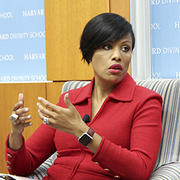
Stephanie Rawlings-Blake was exercising on a treadmill when she received a call notifying her that she would soon become the next mayor of Baltimore. What the call didn’t explain was how her leadership abilities would be repeatedly tested.
Rawlings-Blake inherited an office that had been tarnished by her predecessor, who resigned after being found guilty of embezzlement. She was also left with a structural budget deficit that hadn’t been addressed in years. A day after her swearing-in, in 2010, the region was hit by a storm that buried the city in more than two-feet of snow.
More recently, Rawlings-Blake had to work to address violent unrest in her city following Freddie Gray’s death while in police custody. She also faced criticism for her response to the protests and violence. Besides the major challenges, she had to address problems relating to abandoned buildings, blight, and even how residents were billed for water use.
What drives her as she addresses the challenges facing the city of more than 622,000 people is her belief that she is called to her leadership role.
“I sincerely in my heart understand that even on my worst day I was blessed to be able to do what I do, to have a job that I feel totally called to do, and have it be something that makes a difference. I know that there are people who live and die and never for a day get a chance to work in a job that they feel called to do, or in a job that they feel makes a difference,” she said.
Rawlings-Blake’s comments were made November 3 during a conversation at HDS with alumnae Melissa Bartholomew, MDiv ’15, taking place as HDS celebrates its bicentennial this academic year. The public talk, “Spiritually Resilient Leadership in the Midst of Adaptive Problems,” focused on the challenges of leading a city in today's turbulent racial and political climate. It is was part of the School’s “Administration and Leadership” course, in which students explore diverse contexts within organizations that many graduates will lead, from faith groups to nonprofits and public service.
Assistant Dean for Ministry Studies, Emily Click, who teaches the course, said it focuses on “adaptive problems,” a phrase coined by Ronald Heifetz, founder of the Center for Public Leadership at Harvard Kennedy School.
Adaptive problems “are the kinds of problems that aren’t easy to solve, label, or even understand. Adaptive, as opposed to technical problems, have no quick fix. These situations require learning and sustained effort in the face of disappointment and failure,” said Click.
Rawlings-Blake discussed her attempts to reach out to some of those participating in the unrest in Baltimore following Gray’s death.
“Some groups were very frustrated, angry, all amped up, and were either sitting in or protesting. When we approached to try to meet some common ground, we said, we hear you, help us figure out what the issue is; how can we fix it. It was very hard for them to articulate what those things were. I get it. Sometimes it takes a minute to get from anger to progress or to change, but it’s difficult when people are in that space, are frustrated, and they can’t articulate what progress looks like—what justice looks like.
“That has been a challenge. Not just for me. It is where we are as a country right now. People are so deeply hurt, angry, fearful, and have so much mistrust of everything that they don’t even know how to get to better, or how to describe what that looks like,” she said.
In 2015, Rawlings-Blake announced she would not seek re-election. When her current term ends in December, she will have served as Baltimore’s mayor for nearly 7 years.
Reflecting on her early first days in office, Rawlings-Blake recalled spending time in the snow emergency room considering what challenges lie ahead of her.
“I remember thinking, this might not be any of my fault, but it is my responsibility. And it is certainly not my daughter’s fault, or her peers, or the ones that come after her to fix up this mess. It was in that time that it really crystalized in my mind that I had a duty to make things better than the way they were left for me,” she said. “I refuse to kick the can down the road. I was determined that if there was a difficult decision to be made, it was mine to make, not to pass along to whoever succeeded me.”
—by Michael Naughton
